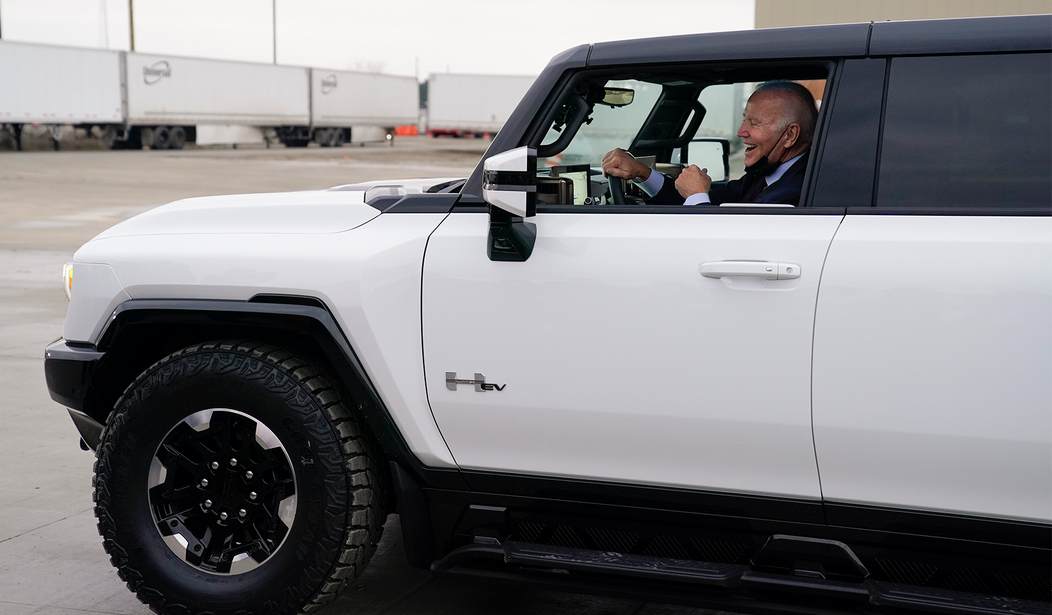Want to see how corrupt the relationship between corporate America and government can be? How about examples of how government mandates and regulations can distort the proper functioning of the market?
There are so many examples it is impossible to cover them all, but looking at just one can give you a flavor.
"Now, they don't want to compete with gas cars."
— Physics Geek (@physicsgeek) November 23, 2024
First of all, LOLOL. Second of all, hahahaha. And last, it sucks to be them.
EV mandates and subsidies have been destroying the auto industry. So much so that Trump's victory this November in Michigan can be partially explained by unionized auto workers bucking their union's recommendation to vote for Kamala Harris. Autoworkers have seen up close how devastating EV mandates have been and want none of them.
Ford alone has been losing tens of thousands of dollars PER electric vehicle they sell, and will lose around $5 billion this year alone.
Yet the automakers ask that Trump keep the EV mandates when he gets into office. In a sane world, this wouldn't happen. But this sort of thing always happens in an economy where government mandates, subsidies, and transnational ESG requirements.
In fact, most automakers don’t love the more stringent rules Mr. Biden put in place. But they have already invested billions in a transition to electric vehicles, and fear that if Mr. Trump made an abrupt change as he has promised, they could be undercut by automakers who sell cheaper, gas-powered cars. They argue it would harm an industry that is a backbone of American manufacturing and employs 1.1 million people.
Lobbyists and officials from several car companies say the automakers want the Biden regulations to remain largely intact, with some changes such as more time for compliance and lower penalties for companies that don’t meet the requirements.
One wild card in negotiations is Elon Musk, the top Trump adviser and chief executive of Tesla, which accounts for half of electric vehicle sales in the United States.
In a previously unreported Nov. 12 letter to Mr. Trump, John Bozzella, president of the Alliance for Automotive Innovation, which represents 42 car companies that produce nearly all the new vehicles sold in the United States, wrote that in order for the auto industry to remain “successful and competitive,” it needed “stability and predictability in auto-related emissions standards.”
Transportation is the sector of the U.S. economy that produces the most greenhouse gases — pollution that is dangerously heating the planet. The Obama administration was the first to limit tailpipe emissions of such pollution. During his first term, Mr. Trump effectively erased those rules, replacing them with standards that were little more than business as usual.
See how this works? Government mandates grossly distorted the market and forced businesses to invest uncounted billions into making products nobody wants, and now the businesses want to protect those investments by forcing everybody else to make and sell vehicles that those same consumers don't want to buy.
It a weird way it makes sense--level the playing field, even if it means screwing the consumers/citizens, who, after all, are simply resources to be exploited for the benefit of government and corporate profits.
“The regulations determine that all automakers have to follow the same rules,” said Stephanie Brinley, an analyst for the Auto Intelligence service at S&P Global Mobility. “You don’t want one automaker sticking to making the cheapest fossil fuel cars to sell domestically, while the other automakers are trying to make these investments to compete globally. If you have a regulation on the books, then everybody has to play by the same rules.”
Rolling back the rules would also pose a problem because automakers plan car models years in advance. Developers in Detroit have already designed the cars they expect to put in showrooms in 2028, under the assumption that the E.V. rules would still be in place.
“The worst thing of all for the automakers, even worse than a difficult regulation, is a back-and-forth swing every four years,” Ms. Brinley said.
The automakers are also hoping to press the point with Mr. Trump that many of their new E.V. manufacturing facilities and battery plants, which are generating jobs and tax revenue, are in states like Ohio, Tennessee, Georgia and South Carolina that he won in this year’s election.
Big corporations don't see themselves as responsible to their customers but to the government. Customers are merely a revenue source for both.
This is the fascist model of the economy--private corporations collaborate with the government to create an economy that serves the state and not the people. Obviously, this is not the "brownshirt" side of fascism, but it is the exact economic model of the ideology. It's not communism but a form of corporatism that elevates the state as the ultimate customer.
Ironically, Elon Musk is helping lead the charge to undermine the EV mandates and subsidies. He has one of the only companies that produces an electric vehicle that people want to buy, and he is about the only one capable of making money while doing so.
The big automakers want the government to give them a leg up. Forcing people to buy EVs will, they believe, level the playing field and turn their losing investments into gold.
It's insane, but only because the rules of the economy are insane.








Join the conversation as a VIP Member